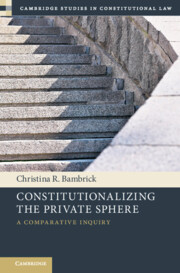Refine search
Actions for selected content:
180 results
The Right to Freedom
-
- Journal:
- Kantian Review , First View
- Published online by Cambridge University Press:
- 11 December 2025, pp. 1-21
-
- Article
-
- You have access
- Open access
- HTML
- Export citation
Introduction
-
- Book:
- Milton's Strenuous Liberty
- Published online:
- 23 October 2025
- Print publication:
- 06 November 2025, pp 1-33
-
- Chapter
- Export citation

Harriet Jacobs
-
- Published online:
- 31 October 2025
- Print publication:
- 20 November 2025
-
- Element
- Export citation
From Individual Virtue to the Just State: Cicero and the Legal Nature of Roman Political Thought
-
- Journal:
- The Journal of Roman Studies , First View
- Published online by Cambridge University Press:
- 15 August 2025, pp. 1-19
-
- Article
-
- You have access
- Open access
- HTML
- Export citation
Chapter 9 - Hegelian Perfectionism before 1848
-
- Book:
- Freedom and Perfection
- Published online:
- 25 July 2025
- Print publication:
- 14 August 2025, pp 246-283
-
- Chapter
- Export citation
Divine domination
-
- Journal:
- Religious Studies , First View
- Published online by Cambridge University Press:
- 04 August 2025, pp. 1-19
-
- Article
-
- You have access
- Open access
- HTML
- Export citation
Chapter 4 - Switzerland
- from Part I - Life and Death
-
-
- Book:
- Percy Shelley in Context
- Published online:
- 17 April 2025
- Print publication:
- 24 April 2025, pp 26-33
-
- Chapter
- Export citation
Who Is the Caregiver in Kant’s Theory of Labour? Examining Social Domination in Classical German Philosophy
-
- Journal:
- Kantian Review , First View
- Published online by Cambridge University Press:
- 22 April 2025, pp. 1-18
-
- Article
-
- You have access
- Open access
- HTML
- Export citation
Redistribution in the Kantian State: Toward a Deontic-Republican Critique of Inequality
-
- Journal:
- Kantian Review , First View
- Published online by Cambridge University Press:
- 11 April 2025, pp. 1-19
-
- Article
-
- You have access
- Open access
- HTML
- Export citation
Kant and Fichte on Freedom and Citizens’ Assent
-
- Journal:
- Kantian Review / Volume 30 / Issue 1 / March 2025
- Published online by Cambridge University Press:
- 27 June 2025, pp. 63-77
- Print publication:
- March 2025
-
- Article
-
- You have access
- Open access
- HTML
- Export citation
8 - Conclusion
- from Transformation
-
- Book:
- Constitutionalizing the Private Sphere
- Published online:
- 23 January 2025
- Print publication:
- 06 February 2025, pp 271-278
-
- Chapter
- Export citation
3 - The United States
- from Equality
-
- Book:
- Constitutionalizing the Private Sphere
- Published online:
- 23 January 2025
- Print publication:
- 06 February 2025, pp 63-100
-
- Chapter
- Export citation
7 - The European Union
- from Transformation
-
- Book:
- Constitutionalizing the Private Sphere
- Published online:
- 23 January 2025
- Print publication:
- 06 February 2025, pp 243-270
-
- Chapter
- Export citation
1 - Introduction
-
- Book:
- Constitutionalizing the Private Sphere
- Published online:
- 23 January 2025
- Print publication:
- 06 February 2025, pp 1-15
-
- Chapter
- Export citation
4 - India
- from Equality
-
- Book:
- Constitutionalizing the Private Sphere
- Published online:
- 23 January 2025
- Print publication:
- 06 February 2025, pp 101-142
-
- Chapter
- Export citation
6 - South Africa
- from Transformation
-
- Book:
- Constitutionalizing the Private Sphere
- Published online:
- 23 January 2025
- Print publication:
- 06 February 2025, pp 188-242
-
- Chapter
- Export citation
5 - Germany
- from Transformation
-
- Book:
- Constitutionalizing the Private Sphere
- Published online:
- 23 January 2025
- Print publication:
- 06 February 2025, pp 148-187
-
- Chapter
- Export citation
2 - A Republican Vein in Liberal Constitutionalism
-
- Book:
- Constitutionalizing the Private Sphere
- Published online:
- 23 January 2025
- Print publication:
- 06 February 2025, pp 16-58
-
- Chapter
- Export citation

Constitutionalizing the Private Sphere
- A Comparative Inquiry
-
- Published online:
- 23 January 2025
- Print publication:
- 06 February 2025
Chapter 7 - Schopenhauer’s Political World
-
- Book:
- Schopenhauer's Politics
- Published online:
- 09 January 2025
- Print publication:
- 23 January 2025, pp 220-243
-
- Chapter
-
- You have access
- Open access
- HTML
- Export citation
